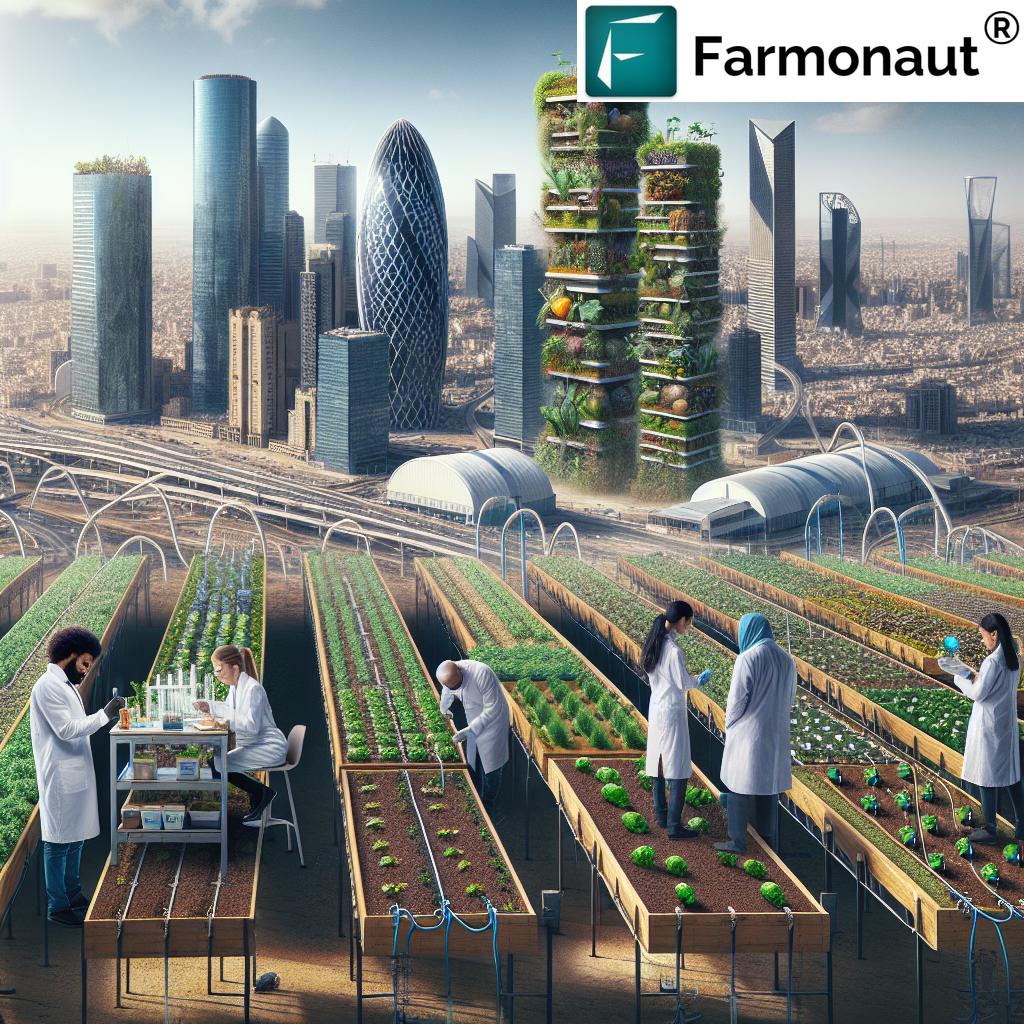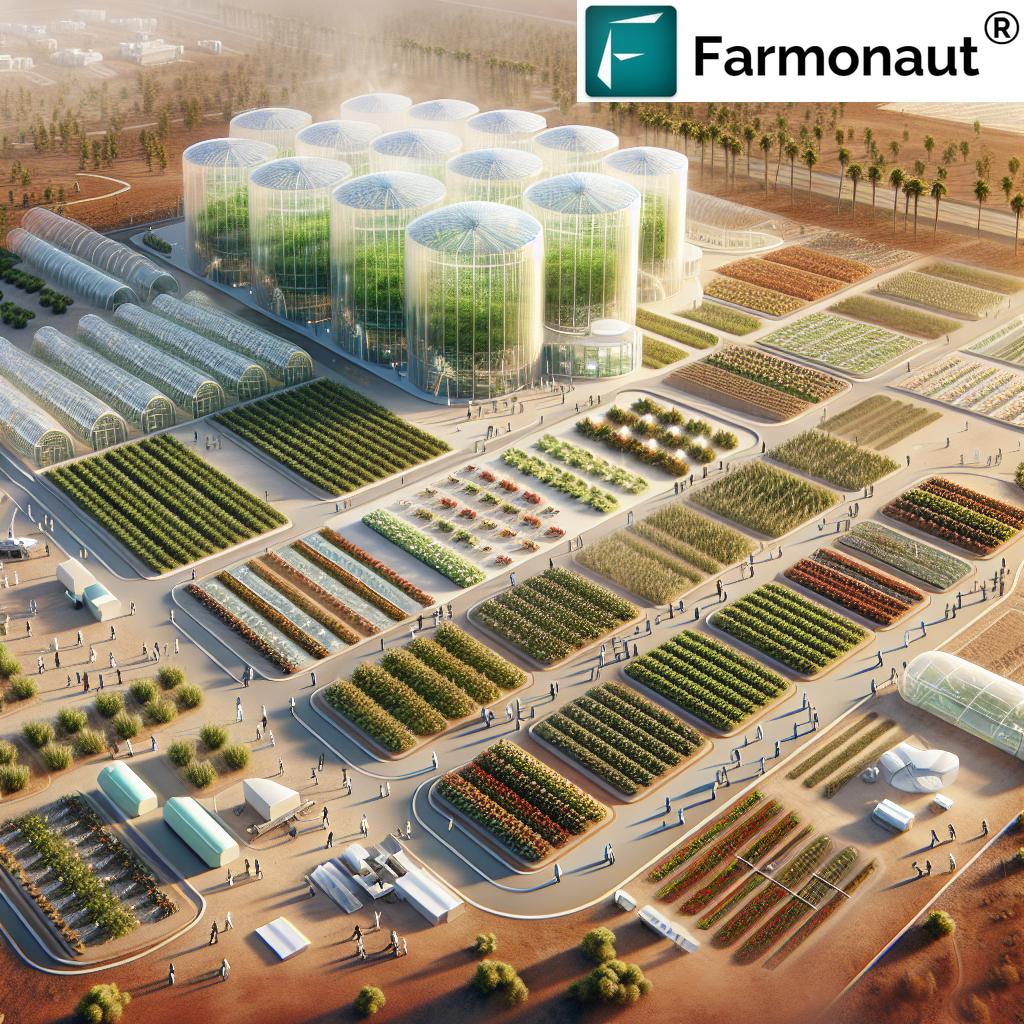Urban Agriculture Revolution: Phoenix Explores Desert Soil Management for Sustainable Cities
“Phoenix’s urban agriculture symposium explores soil restoration techniques for 15% of the city’s arid land.”
Welcome to our comprehensive exploration of the groundbreaking urban agriculture symposium set to take place in Phoenix, Arizona. As we delve into the critical intersection of urban spaces and agricultural lands in arid environments, we’re excited to share insights on desert soil management, water conservation, and climate-resilient crop development. This event promises to reshape our understanding of sustainable farming practices in urban settings, with a particular focus on the unique challenges posed by desert environments.

The Rise of Urban Agriculture in Arid Climates
Urban agriculture has gained significant traction in recent years, but its application in arid environments like Phoenix presents unique challenges and opportunities. The upcoming symposium aims to address these specific issues, focusing on:
- Desert soil management techniques
- Water conservation strategies in agriculture
- Development of climate-resilient crops
- Innovative urban farming techniques
- Soil science for sustainable cities
As we explore these topics, it’s crucial to understand the role of technology in advancing urban agriculture. Farmonaut, a leading agricultural technology company, offers solutions that align perfectly with these emerging trends. Through satellite-based farm management and AI-driven advisory systems, Farmonaut is at the forefront of addressing agronomic challenges in urban and desert settings.
Desert Soil Management: Overcoming Arid Challenges
One of the primary focuses of the Phoenix symposium is desert soil management. Arid environments pose significant challenges for agriculture, including:
- Low organic matter content
- High salinity levels
- Poor water retention capacity
- Vulnerability to wind erosion
To address these issues, researchers and agronomists are developing innovative techniques for urban soil restoration. These methods aim to improve soil quality, increase water retention, and enhance overall fertility in desert urban environments.
Water Conservation in Urban Agriculture
In arid climates like Phoenix, water conservation is paramount. The symposium will explore cutting-edge techniques for efficient water use in urban farming, including:
- Drip irrigation systems
- Greywater recycling
- Rainwater harvesting
- Soil moisture sensors
- Drought-resistant crop varieties
These strategies not only conserve precious water resources but also make urban agriculture more sustainable and economically viable in desert environments.
Explore Farmonaut’s API for advanced agricultural data
Climate-Resilient Crop Development
As global climate change continues to impact agricultural practices, the development of climate-resilient crops has become increasingly important. The Phoenix symposium will highlight research on:
- Heat-tolerant plant varieties
- Crops with improved water use efficiency
- Salt-tolerant species for arid urban environments
- Genetic modifications for enhanced resilience
These advancements in crop science are crucial for ensuring food security in urban areas, particularly in challenging desert climates.
Innovative Urban Farming Techniques
The symposium will showcase a range of innovative urban farming techniques specifically adapted for desert environments. These include:
- Vertical gardening systems
- Rooftop agriculture
- Hydroponic and aquaponic setups
- Controlled environment agriculture (CEA)
- Urban food forests
These methods maximize limited urban space while minimizing water usage and soil requirements, making them ideal for arid city environments like Phoenix.
Check out Farmonaut’s API Developer Docs
Soil Science for Sustainable Cities
The intersection of soil science and urban planning is a crucial aspect of creating sustainable cities in desert regions. The symposium will delve into topics such as:
- Urban soil health assessment
- Remediation of contaminated urban soils
- Green infrastructure for soil conservation
- Integration of soil management in urban design
These discussions will highlight the importance of healthy soils in urban ecosystems and their role in supporting sustainable urban agriculture.

Ecological Research in Cities: Shaping the Future of Food Production
The Phoenix symposium underscores the growing importance of ecological research in urban environments. This research is crucial for:
- Understanding urban microclimates
- Assessing the impact of urban agriculture on local ecosystems
- Developing sustainable urban food systems
- Mitigating the urban heat island effect through green spaces
By integrating ecological principles into urban agriculture, cities like Phoenix can create more resilient and sustainable food production systems.
The Role of Technology in Urban Agriculture
Technology plays a pivotal role in advancing urban agriculture, especially in challenging environments like Phoenix. The symposium will explore various technological solutions, including:
- Remote sensing for crop monitoring
- AI-driven irrigation systems
- Precision agriculture techniques
- IoT devices for environmental monitoring
Companies like Farmonaut are at the forefront of this technological revolution, offering satellite-based crop health monitoring and AI advisory systems that can significantly enhance urban farming practices.
Addressing Global Climate Change Impacts on Agriculture
The Phoenix symposium will also address the broader implications of climate change on urban agriculture. Key topics include:
- Adapting urban farming practices to changing climate patterns
- Reducing the carbon footprint of urban food production
- Enhancing urban biodiversity through agriculture
- Creating climate-resilient urban food systems
These discussions are crucial for developing strategies to ensure food security in the face of global environmental challenges.
“Urban farming in Phoenix aims to reduce water usage by 30% through innovative desert agriculture practices.”
Building Resilience in the Face of Resource Scarcity
One of the key themes of the Phoenix symposium is building resilience in urban agriculture systems. This includes:
- Developing drought-resistant urban farming methods
- Creating closed-loop systems for resource recycling
- Implementing energy-efficient farming technologies
- Promoting community engagement in urban agriculture
By focusing on resilience, urban farmers and planners can create sustainable food production systems that thrive even in resource-scarce environments.
The Future of Urban Agriculture in Desert Environments
As we look to the future, the Phoenix symposium offers a glimpse into the potential of urban agriculture in desert environments. Some exciting prospects include:
- Integration of urban farms into smart city planning
- Development of desert-specific urban farming techniques
- Creation of urban food oases in arid climates
- Expansion of vertical farming in desert cities
These innovations promise to transform urban landscapes and food systems in arid regions around the world.
Urban Agriculture Techniques for Desert Environments
| Technique | Water Efficiency (1-5) | Soil Management (1-5) | Climate Resilience (1-5) | Description | Urban Applicability |
|---|---|---|---|---|---|
| Vertical Gardening | 4 | 3 | 4 | Uses vertical space to grow plants, reducing land and water requirements | Excellent for small urban spaces, balconies, and walls |
| Hydroponic Systems | 5 | N/A | 4 | Grows plants in nutrient-rich water without soil | Ideal for indoor urban environments and rooftops |
| Xeriscaping | 5 | 4 | 5 | Landscaping designed specifically for arid environments | Perfect for urban parks and public spaces in desert cities |
| Rooftop Gardens | 3 | 4 | 3 | Utilizes building rooftops for growing plants and vegetables | Excellent use of unused urban space, improves building insulation |
Conclusion: Embracing the Urban Agriculture Revolution
The upcoming symposium in Phoenix represents a significant step forward in our understanding and implementation of urban agriculture in desert environments. By exploring innovative techniques in desert soil management, water conservation, and climate-resilient crop development, we are paving the way for more sustainable and resilient cities.
As we continue to face challenges related to climate change and resource scarcity, the importance of urban agriculture in ensuring food security and environmental sustainability cannot be overstated. The insights and innovations shared at this symposium will undoubtedly shape the future of urban farming practices not only in Phoenix but in arid regions around the world.
We encourage all stakeholders – from urban planners and agronomists to technology providers like Farmonaut – to engage with these emerging trends and contribute to the ongoing revolution in urban agriculture. Together, we can create more sustainable, resilient, and food-secure cities, even in the most challenging environmental conditions.
FAQs
- What is urban agriculture?
Urban agriculture refers to the practice of cultivating, processing, and distributing food in or around urban areas. It can include various forms such as community gardens, rooftop farms, vertical farming, and more. - Why is desert soil management important for urban agriculture?
Desert soil management is crucial because arid environments pose unique challenges such as low organic matter, high salinity, and poor water retention. Proper management techniques can improve soil quality and make urban farming viable in these challenging conditions. - How does water conservation play a role in urban agriculture in Phoenix?
Water conservation is essential in arid climates like Phoenix. Urban agriculture projects in the city focus on efficient irrigation systems, drought-resistant crops, and water recycling techniques to minimize water usage while maximizing crop yields. - What are some examples of climate-resilient crops suitable for desert urban farming?
Climate-resilient crops for desert urban farming might include heat-tolerant varieties of tomatoes, peppers, and leafy greens, as well as native desert plants like prickly pear cactus and mesquite. - How can technology like Farmonaut’s solutions benefit urban agriculture in desert environments?
Technologies like Farmonaut’s satellite-based crop monitoring and AI advisory systems can help urban farmers in desert environments by providing real-time data on crop health, optimizing water usage, and offering tailored advice for managing crops in challenging conditions.
















